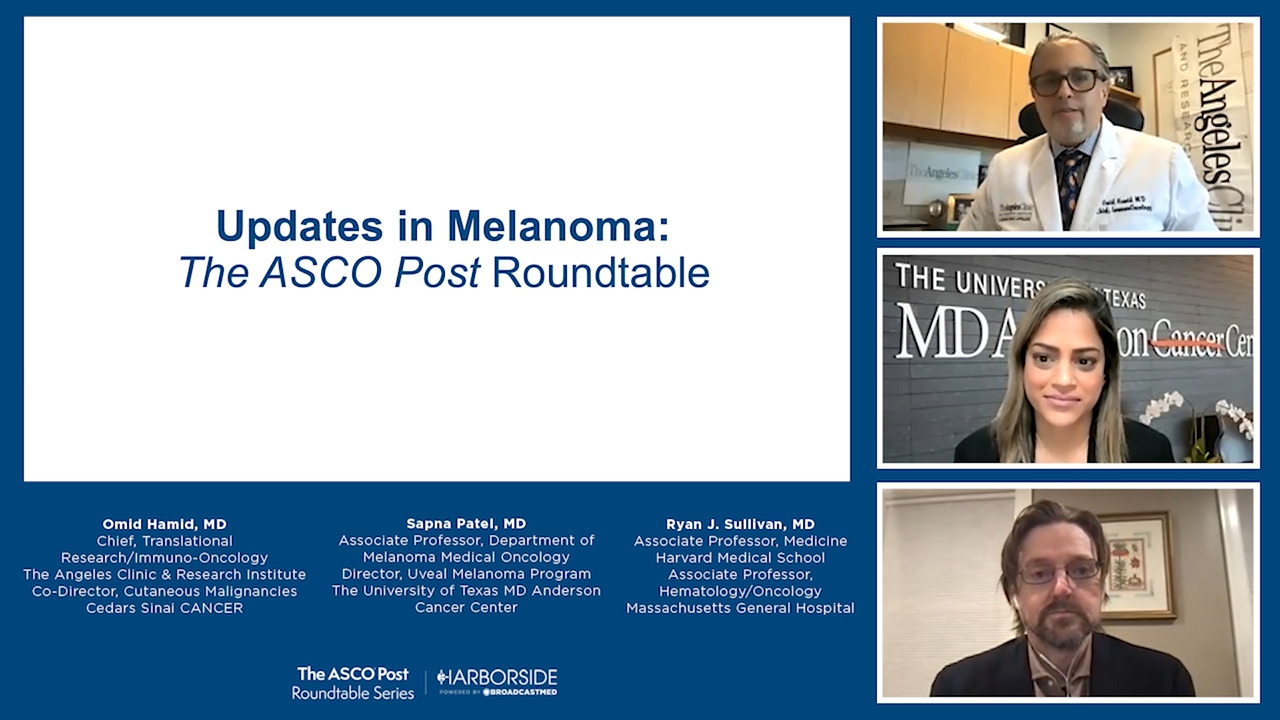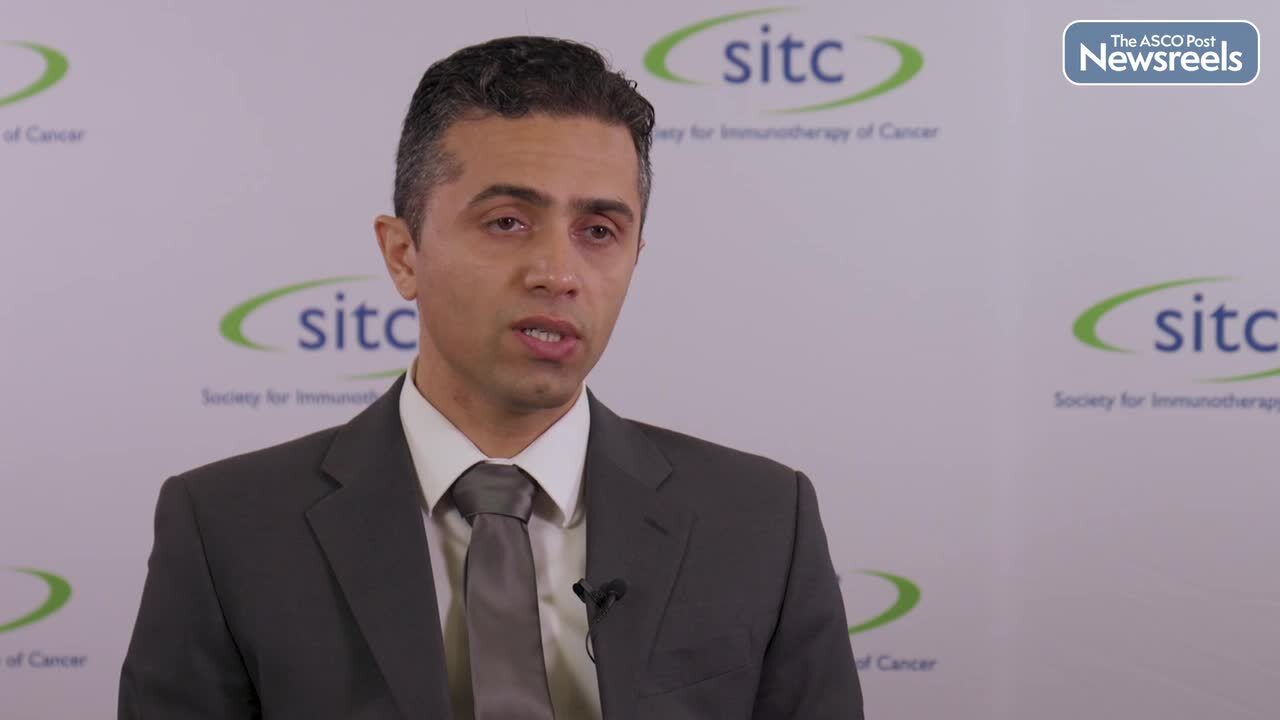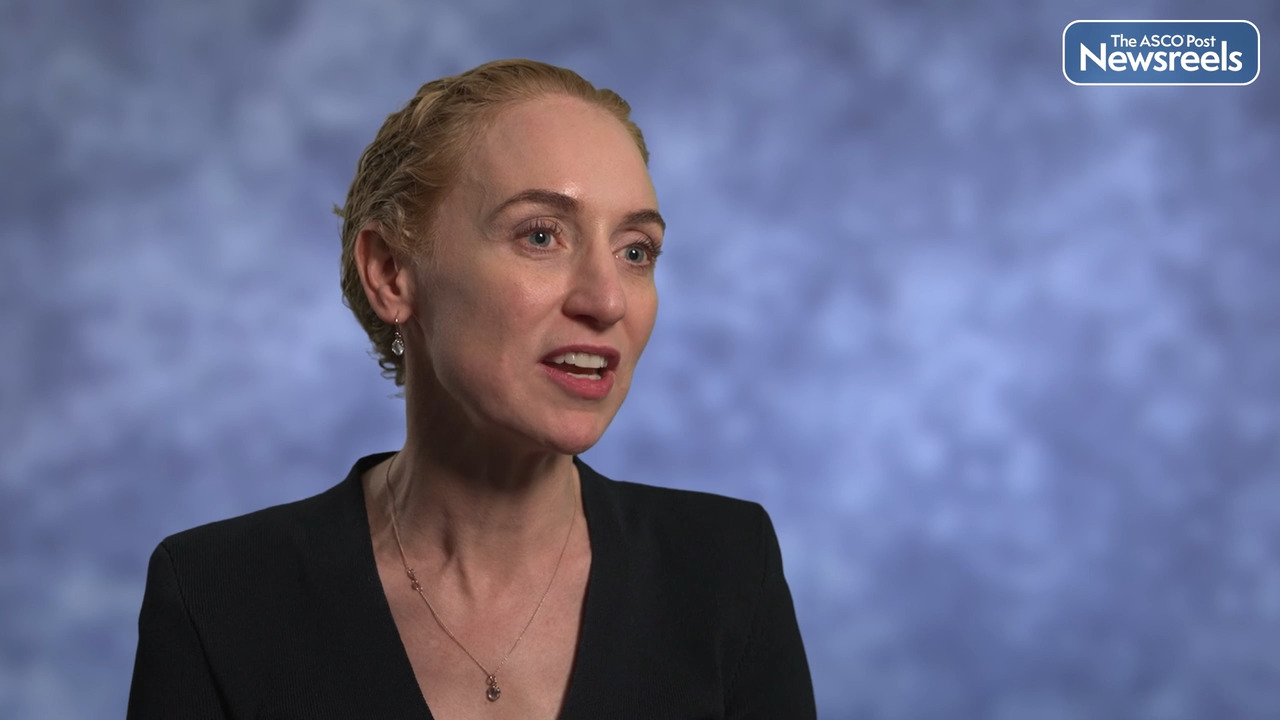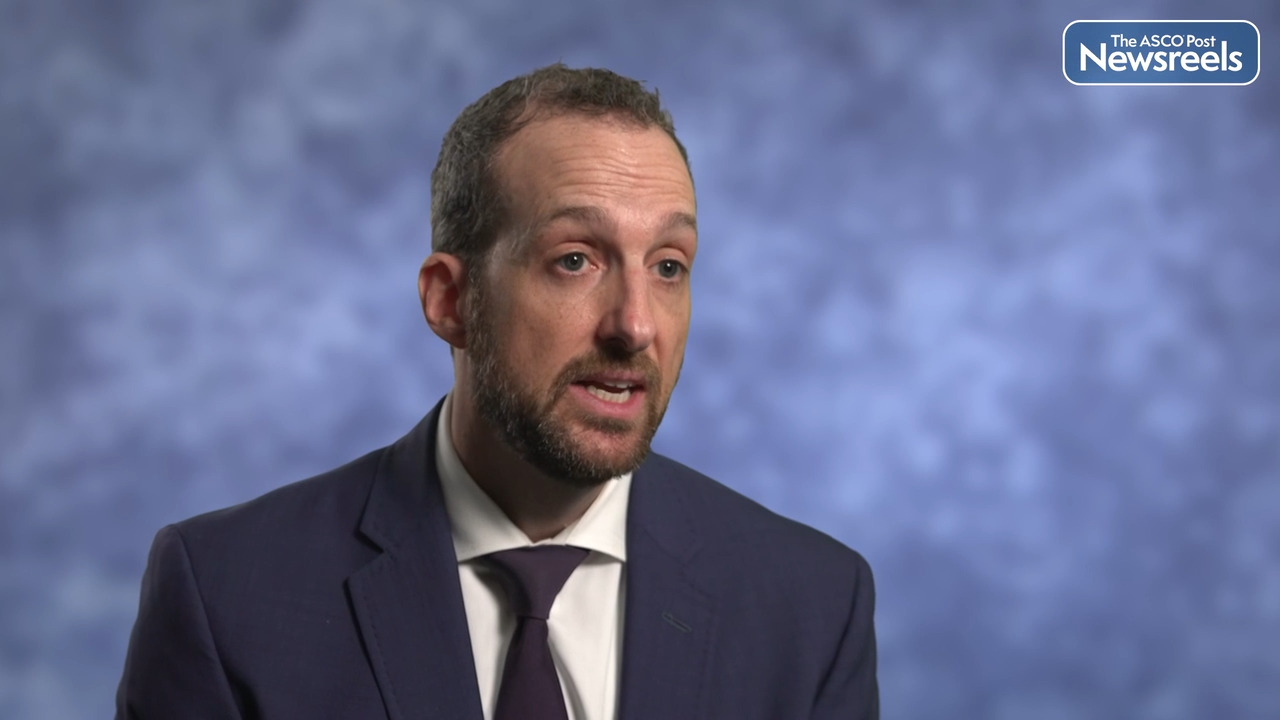Neoadjuvant Therapy in Malignant Melanoma
This is Part 2 of Updates in Melanoma, a four-part video roundtable series. Scroll down to watch the other videos from this Roundtable. In this video, Drs. Omid Hamid, Sapna Patel, and Ryan Sullivan discuss current adjuvant treatment options in malignant melanoma. The patient is a 67-year-old man with a long-standing mole on his leg that has begun to change over the past year. A biopsy shows a 2.2-mm melanoma, nonulcerated, and the tumor is BRAF-positive. Physical examination reveals palpable lymphadenopathy in the inguinal area. The faculty discuss the current neoadjuvant armamentarium for malignant melanoma, reviewing the implications of the OpACIN and S1801 trials and highlighting possible ways to deescalate surgery and adjuvant therapy.
Adjuvant Therapy in Malignant Melanoma
This is Part 1 of Updates in Melanoma, a four-part video roundtable series. Scroll down to watch the other videos from this Roundtable. In this video, Drs. Omid Hamid, Sapna Patel, and Ryan Sullivan discuss current adjuvant treatment options in malignant melanoma. The patient is a 67-year-old man with a long-standing mole on his leg that has begun to change over the past year. A biopsy shows a 2.2-mm melanoma, nonulcerated, with no palpable lymph nodes in the inguinal area. CT and PET scans show no evidence of metastatic disease, sentinel lymph nodes are negative, and the tumor is BRAF-positive. The faculty discuss the role of immunotherapy in the adjuvant treatment of stage II-IV melanoma, highlighting recent trials such as COMBI-AD, CheckMate 238, and KEYNOTE-54. In addition, they emphasize the importance of testing for BRAF status when making treatment decisions.
Methotrexate May Be Associated With an Increased Risk for Some Skin Cancers
Methotrexate may be linked to an elevated risk of three types of skin cancer, according to a new study published by Polesie et al in the British Journal of Cancer. Additionally, among patients taking the drug to treat moderate to severe psoriasis, an increased risk was observed only for basal cell...
Study Explores the Addition of First-Line Atezolizumab in BRAF V600–Mutant Advanced Melanoma
As reported in The Lancet Oncology by Paolo A. Ascierto, MD, of the Istituto Nazionale Tumori Istituto di Ricovero e Cura a Carattere Scientifico Fondazione Pascale, Naples, and colleagues, the second interim overall survival analysis of the phase III IMspire150 trial has shown a numeric but...
Interventions to Improve Skin Cancer Surveillance in Childhood Cancer Survivors Who Received Radiotherapy
In a study (Advancing Survivors Knowledge; ASK) reported in the Journal of Clinical Oncology, Geller et al found that three patient- and patient/physician-based interventions to improve skin cancer surveillance among childhood cancer survivors treated with radiotherapy resulted in increased rates...
Nonablative Fractional Laser Therapy May Help Prevent Nonmelanoma Skin Cancers
Researchers discovered that simple laser treatments to the skin may help prevent the development of basal cell carcinoma and squamous cell carcinoma, according to a new study published by Benson et al in Dermatologic Surgery. Background Collectively known as keratinocyte carcinomas, basal cell...
Experts Publish Consensus Statement on Classification System for Pathology and Diagnosis of Melanocytic Lesions
In recognition of continuing issues with the process of melanocytic pathology assessments, an expert panel of three dermatopathologists—with assistance from an expert team of researchers—has developed and now revised the Melanocytic Pathology Assessment Tool and Hierarchy for Diagnosis schema...
Fewer Cases of Melanoma Found Among Individuals Taking Vitamin D Supplements
Fewer cases of melanoma were observed among individuals who regularly took vitamin D supplements than among those who did not take the supplements, according to a new study published by Kanasuo et al in Melanoma Research. Researchers also found that individuals taking vitamin D supplements...
Expert Point of View: Ryan J. Sullivan, MD
Ryan J. Sullivan, MD, Associate Professor of Medicine at Harvard Medical School, and Associate Professor of Hematology/Oncology at Massachusetts General Hospital, Boston, told The ASCO Post that tumor-infiltrating lymphocyte (TIL) cell therapy is likely to become a standard practice in the field....
Study Finds Lifileucel Active in Advanced Melanoma After Disease Progression on Immune Checkpoint Inhibitors
Cell therapy with tumor-infiltrating lymphocytes (TIL) may address an important unmet need for patients with difficult-to-treat melanoma after disease progression on immune checkpoint inhibitors, according to data presented during the 2022 Society for Immunotherapy of Cancer (SITC) Annual ...
TIL Therapy vs Ipilimumab in Advanced Melanoma
In a Dutch-Danish phase III trial reported in The New England Journal of Medicine, Rohaan et al found that tumor-infiltrating lymphocyte (TIL) therapy prolonged progression-free survival vs ipilimumab in patients with advanced melanoma. Study Details The open-label trial included 168 patients...
Addition of First-Line Atezolizumab to Vemurafenib/Cobimetinib in BRAF V600–Mutant Advanced Melanoma
As reported in The Lancet Oncology by Paolo A. Ascierto, MD, and colleagues, the second interim overall survival analysis of the phase III IMspire150 trial has shown a numeric but statistically nonsignificant improvement with the addition of first-line atezolizumab to vemurafenib and cobimetinib in ...
Adjuvant Pembrolizumab May Improve Quality of Life in Patients With High-Risk Resected Melanoma
Taken together with the primary clinical results, a secondary analysis of the phase III SWOG S1404 randomized clinical trial demonstrated that pembrolizumab provides superior clinical and patient-reported quality-of-life outcomes compared to standard of care with adjuvant ipilimumab or high-dose...
Saman Maleki, PhD, on Melanoma: Reducing Primary Resistance to Immunotherapy
Saman Maleki, PhD, of Canada’s Western University and Lawson Health Research Institute, discusses modifying the gut microbiome in patients with advanced melanoma to induce a response to anti–PD-1 therapy and potentially reduce primary resistance to immunotherapy. A fecal microbiota transplant from healthy donors before treatment appears to be beneficial (Abstract 614).
Researchers Identify Subset of Patients With Stage I Melanoma Who Have Low Risk of Melanoma Mortality
Researchers identified a subset of patients who had early-stage melanoma with almost no melanoma-related deaths, potentially representing cases contributing to overdiagnosis, according to a new study published by Eguchi et al in Cancer. The findings may help clinicians determine which patients have ...
New Phase I/II Data on the CD40 Antibody Sotigalimab in Combination With Pembrolizumab in Patients With Metastatic Melanoma
New data from an ongoing phase II trial evaluating first-line intratumoral administration of sotigalimab, a CD40 agonist antibody, in combination with systemic pembrolizumab, an anti–PD-1 antibody, in metastatic melanoma was presented by Bentebibel et al at the Society for Immunotherapy of Cancer...
Management of Severe Immune-Related Adverse Events With Ipilimumab/Nivolumab and Survival in Advanced Melanoma
In a Dutch study reported in JAMA Oncology, van Not et al found that management of grade ≥ 3 immune-related adverse events with steroids alone vs steroids plus second-line immunosuppressants was associated with better survival outcomes among patients receiving first-line combination ipilimumab and...
Expert Point of View: Ignacio Melero, MD, PhD
Ignacio Melero, MD, PhD, Professor of Immunology and Co-Director of the Department of Immunology and Immunotherapy at the Clinica Universidad de Navarra in Spain, was the invited discussant of the M14TIL study. He noted that a 50% relative reduction in the risk of disease progression is impressive...
Prolonging Remission in Anti–PD-1 Refractory Melanoma With Tumor-Infiltrating Lymphocyte Therapy
For the first time in a multicenter randomized trial, T-cell therapy has been shown to improve outcomes in a solid tumor. In the phase III M14TIL trial, first-line or second-line treatment with tumor-infiltrating lymphocytes (TIL) led to a 50% reduction in disease progression or death from advanced ...
KEYNOTE-716: Distant Metastasis–Free Survival With Adjuvant Pembrolizumab in Resected Stage IIB or IIC Melanoma
As reported in The Lancet Oncology by Georgina V. Long, MBBS, PhD, and colleagues, an analysis from the phase III KEYNOTE-716 trial has shown significant improvement in the secondary endpoint of distant metastasis–free survival with adjuvant pembrolizumab vs placebo in resected stage IIB or IIC...
Expert Point of View: Alexander M.M. Eggermont, MD; Omid Hamid, MD; and James Larkin, PhD
The results of SWOG S18011 were met with enthusiasm by attendees at the Presidential Symposium of the European Society for Medical Oncology (ESMO) Congress 2022. The ASCO Post captured the thoughts of several melanoma experts, who had somewhat different ideas about the immediate clinical...
SWOG S1801: Addition of Neoadjuvant Pembrolizumab to Adjuvant Pembrolizumab Yields Benefits in High-Risk Resectable Melanoma
In resectable stage III to IV melanoma, three cycles of neoadjuvant pembrolizumab followed by adjuvant pembrolizumab was significantly more beneficial than adjuvant pembrolizumab alone, based on the results of the phase II SWOG S1801 trial presented in a Presidential Symposium at the European...
Neoadjuvant Immunotherapy With Relatlimab and Nivolumab in Stage III Melanoma
The combination of immune checkpoint inhibitors relatlimab and nivolumab for patients with stage III melanoma given before surgery was safe and completely cleared all viable tumor in 57% of patients in a phase II study, according to findings published by Amaria et al in Nature. In addition to...
Phase II Trial Reports High Response Rates With Neoadjuvant Cemiplimab in Cutaneous Squamous Cell Carcinoma
In an international, multicenter phase II clinical trial, almost two-thirds of patients with stage II to IV cutaneous squamous cell carcinoma had tumors nearly or completely eradicated by neoadjuvant treatment with cemiplimab-rwlc, an agent targeting PD-1. The results were presented at the European ...
Mediterranean Diet May Improve Immunotherapy Response Rates and Progression-Free Survival in Advanced Melanoma, New Study Suggests
Following a Mediterranean diet rich in fiber, monounsaturated fatty acids, and polyphenols may be associated with improved immunotherapy response rates and progression-free survival in patients with advanced melanoma, according to a recent study presented at the United European Gastroenterology...
Nivolumab/Ipilimumab vs Dabrafenib/Trametinib With Switch at Disease Progression for Metastatic BRAF-Mutant Melanoma
As reported in the Journal of Clinical Oncology by Michael B. Atkins, MD, and colleagues, the phase III DREAMseq trial (ECOG-ACRIN EA6134) showed that first-line treatment with nivolumab plus ipilimumab followed at disease progression with dabrafenib and trametinib improved 2-year overall survival...
Expert Point of View: Alexander M.M. Eggermont, MD; Omid Hamid, MD; and James Larkin, PhD
The results of SWOG S18011 were met with enthusiasm by attendees at the Presidential Symposium of the European Society for Medical Oncology (ESMO) Congress 2022. The ASCO Post captured the thoughts of several melanoma experts, who had somewhat different ideas about the immediate clinical...
SWOG S1801: Addition of Neoadjuvant Pembrolizumab to Adjuvant Pembrolizumab Yields Benefits in High-Risk Resectable Melanoma
In resectable stage III to IV melanoma, three cycles of neoadjuvant pembrolizumab followed by adjuvant pembrolizumab was significantly more beneficial than adjuvant pembrolizumab alone, based on the results of the phase II SWOG S1801 trial presented in a Presidential Symposium at the European...
Adjuvant Nivolumab/Ipilimumab vs Nivolumab in Resected Stage IIIB–D or IV Melanoma
As reported in the Journal of Clinical Oncology by Jeffrey S. Weber, MD, PhD, and colleagues, the phase III CheckMate 915 trial showed no improvement in recurrence-free survival with adjuvant nivolumab/ipilimumab vs nivolumab in patients with resected stage IIIB–D or IV melanoma. Study Details In...
John B.A.G. Haanen, MD, PhD, on Melanoma: Phase III Data on Treatment With Tumor-Infiltrating Lymphocytes vs Ipilimumab
John B.A.G. Haanen, MD, PhD, of The Netherlands Cancer Institute, discusses recent phase III findings, which show that tumor-infiltrating lymphocytes (TILs) improve progression-free survival compared with ipilimumab by 50% in patients with advanced melanoma after not responding to anti–PD-1 treatment. Around 50% of TIL-treated patients had a response, and 20% had a complete response (Abstract LBA3).
New Imaging Technique May Improve Accuracy of Basal Cell Carcinoma Diagnosis
A novel imaging technique may significantly improve the accuracy of the diagnosis of basal cell carcinoma (BCC) compared to clinical and dermoscopic examinations alone, according to new research presented at the 31st European Academy of Dermatology and Venereology (EADV) Congress. The study found...
Adjuvant Nivolumab With or Without Ipilimumab in Patients With Resected Stage IV Melanoma With No Evidence of Disease
As reported in The Lancet by Livingstone et al, the final analysis of the German phase II IMMUNED trial showed significantly improved recurrence-free survival with adjuvant nivolumab/ipilimumab and nivolumab alone vs placebo in patients with resected stage IV melanoma who had no evidence of disease ...
Georgina V. Long, MD, PhD, on Melanoma: Findings on Circulating Tumor DNA, Disease Recurrence, and Immunotherapy
Georgina V. Long, MD, PhD, of the Melanoma Institute Australia, discusses results from the CheckMate 915 trial, an analysis of the pretreatment circulating tumor DNA, along with other clinical and translational baseline factors, and their association with disease recurrence in patients with stage IIIB–D/IV melanoma treated with adjuvant immunotherapy (Abstract 788O).
Sequencing of Ipilimumab/Nivolumab With Encorafenib/Binimetinib in BRAF-Mutant Metastatic Melanoma
In a phase II trial (SECOMBIT) reported in the Journal of Clinical Oncology, Paolo A. Ascierto, MD, and colleagues found that sequential immunotherapy and targeted therapy with ipilimumab/nivolumab followed at disease progression by encorafenib/binimetinib was associated with good survival...
Trends in Incidence of Cutaneous T-Cell Lymphoma in the United States
In a study reported in a research letter in JAMA Oncology, Cai et al found that the incidence of cutaneous T-cell lymphoma increased in the United States between 2000 and 2018. The study involved data from 18 Surveillance, Epidemiology, and End Results (SEER) Program registries for 2000 to 2018. A...
Neil D. Gross, MD, on Cutaneous Squamous Cell Carcinoma: Recent Findings on Cemiplimab
Neil D. Gross, MD, of The University of Texas MD Anderson Cancer Center, discusses data from a phase II study, which showed that neoadjuvant cemiplimab-rwlc in patients with stage II–IV (M0) resectable cutaneous squamous cell carcinoma is active and may enable function-preserving surgery in some cases (Abstract 789O).
Dual Checkpoint Inhibitor Blockade as First-Line or Salvage Therapy for Patients With Advanced Merkel Cell Carcinoma
Merkel cell carcinoma has a high rate of metastasis and poor patient outcomes. The current standard of care for patients with recurrent, unresectable, or metastatic disease is immune checkpoint inhibitor monotherapy targeting PD-1 and PD-L1, but only about half of patients respond to this therapy....
Neoadjuvant Cemiplimab in Patients With Stage II to IV Cutaneous Squamous Cell Carcinoma
In an international, multicenter phase II clinical trial, 63.3% of patients with stage II to IV cutaneous squamous cell carcinoma saw their tumors nearly or completely eradicated when treated with the anti–PD-1 agent cemiplimab-rwlc before surgery. The results were presented by Gross et al at the...
SWOG S1801: Neoadjuvant and Adjuvant Pembrolizumab for Patients With Stage IIIB to IV Melanoma
Patients with high-risk melanoma who received the anti–PD-1 therapy pembrolizumab both before and after surgery to remove cancerous tissue had a significantly lower risk of their cancer recurring than similar patients who received the drug only after surgery. These results from a study by the SWOG...
Sapna P. Patel, MD, on Melanoma: New Data on Pembrolizumab, Adjuvant vs Neoadjuvant Plus Adjuvant
Sapna P. Patel, MD, of The University of Texas MD Anderson Cancer Center, discusses the latest findings from the SWOG S1801 trial, which showed that using single-agent pembrolizumab as neoadjuvant therapy improved event-free survival compared to adjuvant therapy in high-risk resectable stage III–IV melanoma (Abstract LBA6).
M14TIL: Tumor-Infiltrating Lymphocytes for Patients With Advanced Melanoma
A novel treatment strategy with personalized cell therapy significantly improved progression-free survival compared to standard immunotherapy in patients with advanced melanoma, according to results from the phase III M14TIL trial reported by John Haanen, MD, PhD, and colleagues at the European...
Researchers Find DOPA May Protect Against Melanoma and Identify Potential New Therapeutic Targets to Treat Melanoma
People with light skin tones are far more likely to develop melanoma than people with darker skin tones. This large disparity results from far more than can be explained by the ultraviolet (UV) protective effects of melanin pigment, owing in large part to the melanin precursor...
Addition of T-VEC to Pembrolizumab in Advanced Melanoma
As reported in the Journal of Clinical Oncology by Chesney et al, the phase III MASTERKEY-265 trial has shown no significant improvement in progression-free survival or overall survival with the addition of talimogene laherparepvec (T-VEC) to pembrolizumab in patients with advanced melanoma. Study...
Study Evaluates UV Protective Behaviors in American Indian and Alaskan Native Populations
Ultraviolet (UV) protection from the sun and avoiding indoor tanning play important roles in reducing a person’s risk for skin cancer, the most common cancer in the United States and one of the most preventable. A recent article published by Yang et al in the Journal of the American Academy of...
Atezolizumab Plus Vemurafenib/Cobimetinib for Patients With BRAF V600–Mutated Melanoma and CNS Metastases
In the phase II TRICOTEL study reported in The Lancet Oncology, Reinhard Dummer, MD, and colleagues found that the combination of atezolizumab plus vemurafenib and cobimetinib produced durable intracranial responses in patients with BRAF V600–mutated melanoma and central nervous system (CNS)...
Long-Term Regional Disease Control With Sentinel Lymph Node Biopsy in Patients With Melanoma
In an analysis of the Multicenter Selective Lymphadenectomy Trial II reported in JAMA Surgery, Crystal et al found that patients with melanoma with sentinel lymph node (SLN) metastasis who were randomly assigned to observation vs completion lymph node dissection (CLND) following SLN biopsy...
COLUMBUS Trial 5-Year Update: Encorafenib/Binimetinib vs Vemurafenib or Encorafenib in Advanced BRAF V600–Mutant Melanoma
In a 5-year update of part 1 of the phase III COLUMBUS trial reported in the Journal of Clinical Oncology, Dummer et al found a continued benefit of encorafenib plus binimetinib vs vemurafenib in patients with advanced BRAF V600–mutant melanoma. The trial supported the June 2018 approval of...
Lenvatinib Plus Pembrolizumab for Advanced Melanoma Progressing on PD-1/PD-L1 Inhibitor Therapy
In the phase II LEAP-004 trial reported in Journal of Clinical Oncology, Arance et al found that the combination of lenvatinib and pembrolizumab was active in patients with advanced melanoma with confirmed progression on PD-1/PD-L1 inhibitors as monotherapy or in combination with other agents. As...
Risk Stratification and Treatment Implications for Patients With Early-Stage Melanoma and Sentinel Node Metastasis
In a study reported in the Journal of Clinical Oncology, Moncrieff et al found that patients with stage IIIA melanoma (per American Joint Committee on Cancer [AJCC], 8th edition) with sentinel node metastatic tumor deposits ≥ 0.3 mm are at higher risk of disease progression vs those with smaller...
Diagnosing Basal Cell Carcinoma: Optical Coherence Tomography vs Punch Biopsy
In a Dutch trial reported in The Lancet Oncology, Adan et al found that optical coherence tomography (OCT)-guided diagnosis and treatment of basal cell carcinoma was noninferior to that with punch biopsy, currently the guideline-recommended standard for diagnosis and treatment. Study Details In the ...







